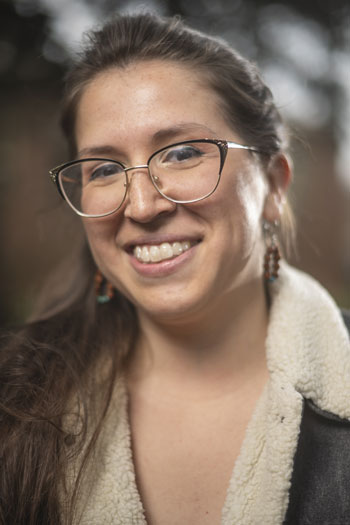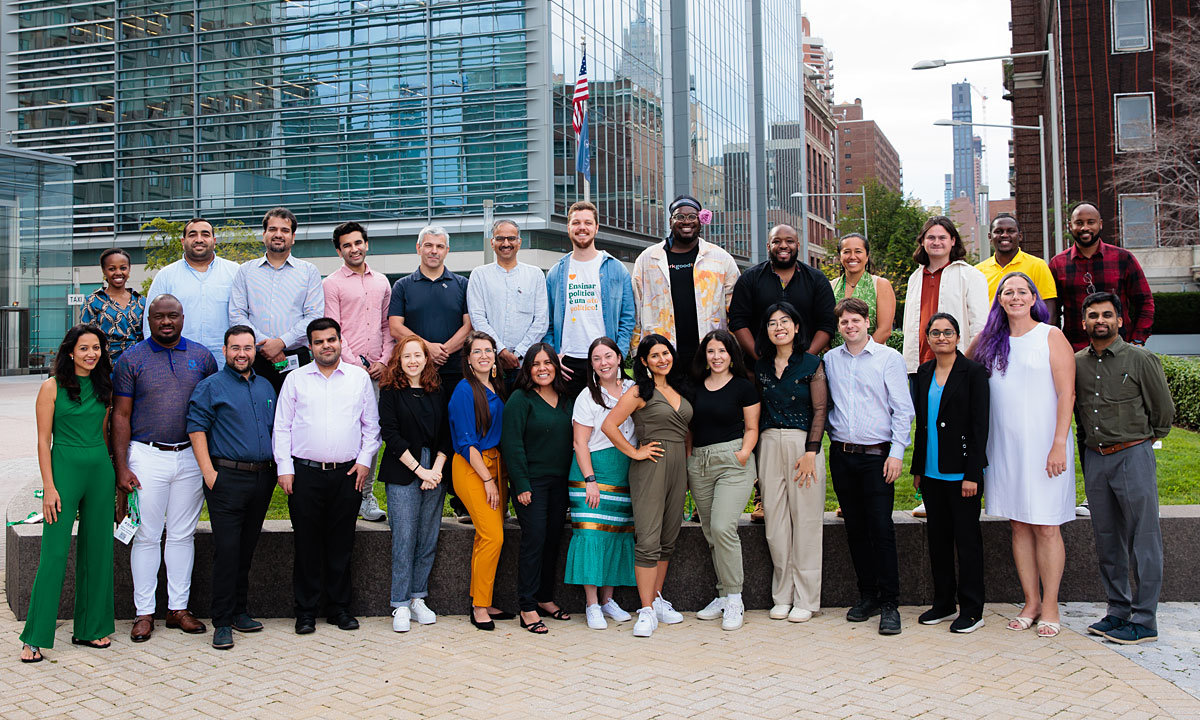UM Student Captures Major Grant for Reducing Carnivore Conflicts on Reservation

By Cary Shimek, UM News Service
MISSOULA – Accomplished scholar Stephanie Barron, an Environmental Studies Program graduate student at the University of Montana, keeps raking in major honors and awards.
Barron is already an Alfred P. Sloan Indigenous Graduate Scholar, Wyss U.S. Conservation Fellow and Wildlife Conservation Network Scholar.
Now MIT recently announced Barron was awarded a prestigious Solve grant. Out of 1,500 applicants worldwide, only 24 proposals were funded.
The mission of Solve is to drive innovative solutions to world challenges. Barron will use her $10,000 award to create online curriculum for Montana’s Confederated Salish & Kootenai Tribes. This resource will combine science with traditional Native ecological knowledge to train people how to coexist with the large carnivores roaming the Flathead Indian Reservation and wilds of western Montana.
“I’m still in some serious shock and disbelief that my project was selected,” Barron said. “Usually these awards go to businesspeople and entrepreneurs who seek to make some profit while they work to benefit the communities they serve. My solution makes no profit, and everything will be owned CSKT at the end. But somehow we convinced businesspeople that a free service for Native people is worth their money.”
Barron is passionate about finding solutions that help big toothy creatures like mountain lions, grizzlies and wolves share Montana with livestock producers, farmers, homeowners, hunters and others. In fact, she came to UM for its Natural Resources Conflict Resolution program, the only graduate program in the nation tailored to provide a working knowledge of collaboration and conflict resolution as applied to land use, natural resources and environmental quality.
Her planned online platform is titled Coalesce Curriculum on Carnivore Coexistence. The curriculum will offer strategies for avoiding carnivore conflicts as it blends videos of Salish elders sharing their language, stories, songs and culture. She said this content already exists and was produced by the Séliš-Ql̓ispé Culture Committee.
“I’m really excited about integrating that into our platform,” Barron said. “We can have videos and audio of elders pronouncing the Salish words for mountain lion or grizzly bear right there. I think this will be a way to normalize the Salish language, their stories and our understanding of carnivores beyond just the antagonistic understanding that Western culture has kind of perpetuated.”
Professor Daisy Rooks served on Barron’s professional paper committee at UM.
“Stephanie’s goal to disseminate knowledge about human-carnivore conflict to Montana youth – some of whom will become the next generation of livestock producers in the state – is truly remarkable,” Rooks said. “Her project is ambitious, especially for a master’s-level graduate student. It is a project that she is uniquely positioned to pull off because of her content knowledge, professional background, training in biology and environmental studies, and the professional connections she’s developed throughout the state.”
Barron has Chiricuhua Apache, Xicana and German ancestry, and she is excited by the growing scientific appreciation for Native traditional ecological knowledge.
“It seems like we are at a cultural acknowledgment point where we are starting to realize that, hey, the wisdom and lessons that have been cultivated over the past 30,000 years in this country – and 50,000 years in other countries and continents – maybe they knew what they were doing,” she said with a laugh. “Maybe we should start tapping into that knowledge and listen to their opinions much more seriously – and especially value that scientific knowledge cultivated through cultural and spiritual practice.”
While earning her UM Natural Resources Conflict Resolution certificate, Barron worked for an organization called People and Carnivores, which allowed her to complete an assessment of the needs of carnivore conflict specialists in the region as part of her NRCR practicum. She interviewed 11 different conflict carnivore specialists in northwest Montana, and they kept mentioning a need for better outreach tools.
Then last year she completed an internship with the Natural Resource Defense Counsel, where she analyzed all carnivore conflict curricula across Montana and the U.S. She found such a curriculum existed in California, but it wasn’t truly relevant to Montana as it lacked material for coexisting with Montana’s wolves and grizzly bears.
She realized there was a need for a Montana training tool. In her MIT Solve proposal, she pointed out Montana livestock owners now report depredation events at four times the rate reported in 2013, and in 2022 CSKT wildlife biologists also responded to over 500 carnivore-conflict calls from both Native and non-Indigenous residents across the reservation.
Barron said carnivores are important to Montana as keystone species needed to help ecosystems function properly. She mentioned how scientists visit mountain lion kill sites after a year and discover they have bloomed with greater insect and native plant diversity. Grizzly bears ramble across the landscape spreading their berry-rich droppings. She said top carnivores positively re-engineer the landscape.
“That’s why we need to learn to get along with them,” she said. “There really is a major need in the carnivore-conflict community for coexistence curriculum and for more education and awareness.”
She said a youthful obsession with cats led to a “deep love and appreciation for carnivores – especially mountain lions – that has kind of always been a fundamental part of myself.”
A first-generation college student, Barron was born in Lansing, Michigan, and moved around a lot with her parents, who worked in the hotel industry. She lived in Ohio for a time before attending high school and college in Virginia. She later moved to California before landing in Montana four years ago as an older-than-average college student.
Her family didn’t have a lot of money, and, like many in her generation, she is still burdened with significant student loan debt. She decided she couldn’t take on any more debt for graduate school. She said an incredible support team at UM, and now at CSKT, helped her earn an impressive slate of scholar awards and grants to help her continue her education.
Barron will graduate from UM in December, and she looks forward to joining the workforce as wildlife biologist or carnivore conflict specialist.
“I’m truly grateful for the relationships and lessons I learned here in Montana and the relationships I’ve been able to cultivate with the Indigenous people here,” she said. “I see this new online curriculum kind of like my gift – a way I get to participate in community-based research in a good way here in Montana.”

###
Contact: Dave Kuntz, UM director of strategic communications, 406-243-5659, dave.kuntz@umontana.edu.